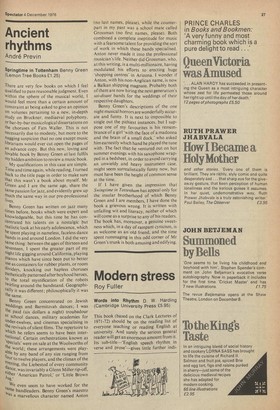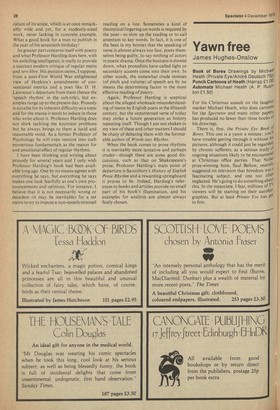Modern stress
Roy Fuller
Words into Rhythm D. W. Harding (Cambridge University Press £5.95) This book (based on the Clark Lectures of 1971-72) should be on the reading list of everyone teaching or reading English at university. And surely the serious general reader will get an enormous amount from it. Its sub-title—'English speech rhythm in verse and prose'—gives little further indi cation of its scope, which is at once remarkably wide and yet, for a modestly-sized work, never lacking in concrete example. What a good book for a man to publish in the year of his seventieth birthday!
Its greater part concerns itself with poetry and what Professor Harding does here, with his unfailing intelligence, is really to provide a succinct modern critique of regular metre and vers lihre. His position stems, I suppose, from a post-First World War enlightened view of Hopkins's amendments of conventional metrics and a poet like D. H. Lawrence's departure from them (hence the 'speech rhythm' in the sub-title), but examples range up to the present day. Prosody is notable for its inherent difficulty as a topic and for the mania it tends to induce in those who write about it. Professor Harding does not shirk tackling the knottiest problems but he always brings to them a lucid and reasonable mind. As a former Professor of Psychology he will even venture into such mysterious fundamentals as the reason for and emotional effect of regular rhythms.
I have been thinking and writing about prosody for several years and I only wish Professor Harding's book had been available long ago. One by no means agrees with everything he says, but everything he says makes one look fearfully at one's own pronouncements and opinions. For instance, I believe that it is not necessarily wrong or decadent (it may be inevitable) for a set metre to try to impose a non-speech-stressed reading on a line. Sometimes a kind of theoretical lingering on words is required by the poet—to slow up the reading or to call attention to key words. In fact, it is one of the bees in my bonnet that the speaking of verse is almost always too fast, poets themselves being guilty, to say nothing of actors in poetic drama. Once the business is slowed down, what prosodists have called light or secondary accents come into their own. In other words, the somewhat crude stresses (of pitch and volume) of speech are by no means the determining factor in the most effective reading of poetry.
Again, Professor Harding is sceptical about the alleged wholesale misunderstanding of metre by English poets in the fifteenth century, but the unpatterned verse of today may strike a future generation as history repeating itself. Though I am not shaken in my view of these and other matters I should be chary of debating them with the formidable author of Words into Rhythm.
When the book comes to prose rhythms it is inevitably more tentative and perhaps cruder—though there are some good discussions, such as that on Shakespeare's prose. Professor Harding's main point of departure is Saintsbury's History of English Prose Rhythm and a rewarding springboard it proves to be. Indeed, Harding's references to books and articles provide no small part of his book's illumination, and his examples for analysis are almost always finely chosen.







































 Previous page
Previous page